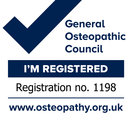What is Osteopathy?
Osteopathy is a method of finding, treating and preventing health problems by using movement, stretch and massage therapies to a person’s muscles and joints.
Osteopathy believes that the well-being of an individual is reliant on the harmonious function between bones, muscles, ligaments and connective tissue. Basing treatment on the principle that treatment should aid in the body healing itself, multiple drug and surgery free methods are used instead.
People consult their osteopath to relieve pain or return to their normal daily activities after injury, and osteopathy can be a very effective treatment to help you to rehabilitate in this kind of event, but osteopathy can also help contribute to your health in many other ways.
One of the basic concepts underpinning osteopathy is to treat the individual in relation to the environmental factors that will influence their health in order to promote the optimum conditions for maintaining good health. In the same way that many people visit their dentist to reduce the likelihood of requiring a filling, occasional check-ups with an osteopath allows potential problems to be detected and treated before they become an issue.
Osteopaths work to restore your body to a state of balance, where possible without the use of drugs or surgery. Osteopathy is a safe, gentle form of manual therapy suitable for patients of any age. Using touch, physical manipulation, stretching and massage an osteopath can increase the mobility of joints, relieve muscle tension, enhance the blood and nerve supply to tissues, and help your body’s own healing mechanisms. They may also provide advice on lifestyle, posture and exercise to aid recovery, promote health and prevent symptoms recurring. In any case, early intervention is key and makes a swift and full recovery much more likely, so if you suffer from occasional discomfort, consider consulting an osteopath, as preventative treatment and advice can be a worthwhile investment in your long-term health.
Osteopathy can be used alone or as a compliment to other conventional and alternative medical therapies.
The National Institutes of Clinical Excellence advises that GPs can safely refer patients to an osteopath for treatment. Osteopathy is available on the NHS in some areas of the UK.
Osteopathy believes that the well-being of an individual is reliant on the harmonious function between bones, muscles, ligaments and connective tissue. Basing treatment on the principle that treatment should aid in the body healing itself, multiple drug and surgery free methods are used instead.
People consult their osteopath to relieve pain or return to their normal daily activities after injury, and osteopathy can be a very effective treatment to help you to rehabilitate in this kind of event, but osteopathy can also help contribute to your health in many other ways.
One of the basic concepts underpinning osteopathy is to treat the individual in relation to the environmental factors that will influence their health in order to promote the optimum conditions for maintaining good health. In the same way that many people visit their dentist to reduce the likelihood of requiring a filling, occasional check-ups with an osteopath allows potential problems to be detected and treated before they become an issue.
Osteopaths work to restore your body to a state of balance, where possible without the use of drugs or surgery. Osteopathy is a safe, gentle form of manual therapy suitable for patients of any age. Using touch, physical manipulation, stretching and massage an osteopath can increase the mobility of joints, relieve muscle tension, enhance the blood and nerve supply to tissues, and help your body’s own healing mechanisms. They may also provide advice on lifestyle, posture and exercise to aid recovery, promote health and prevent symptoms recurring. In any case, early intervention is key and makes a swift and full recovery much more likely, so if you suffer from occasional discomfort, consider consulting an osteopath, as preventative treatment and advice can be a worthwhile investment in your long-term health.
Osteopathy can be used alone or as a compliment to other conventional and alternative medical therapies.
The National Institutes of Clinical Excellence advises that GPs can safely refer patients to an osteopath for treatment. Osteopathy is available on the NHS in some areas of the UK.


